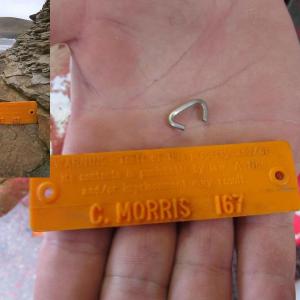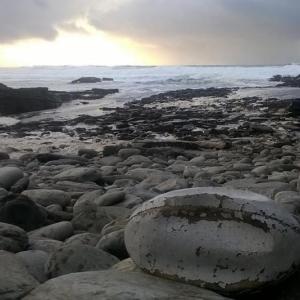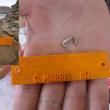Tenants Harbor lobsterman’s trap tag ends up on Scotland’s Orkney Islands
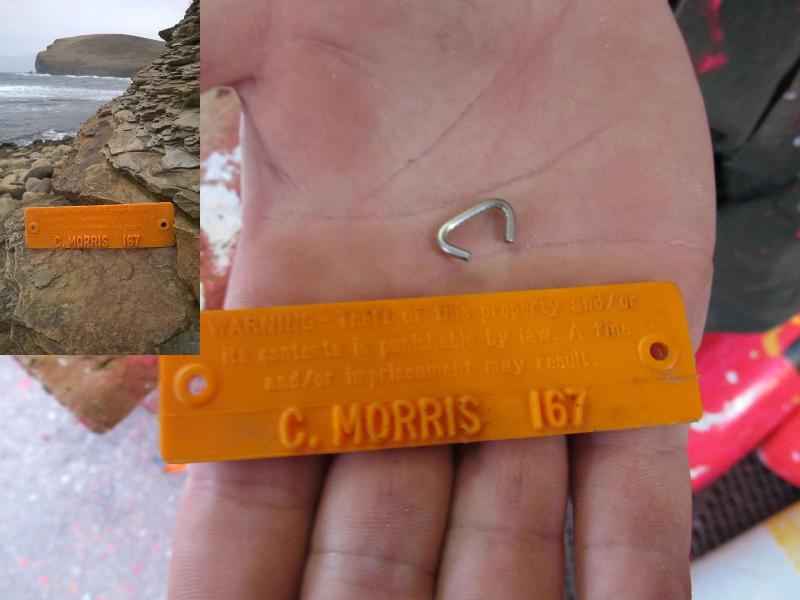 One of Corey Morris’ trap tags discovered on Billiacru Beach SW of the Orkney Islands in Scotland (inset) and another tag with a hog ring in Corey’s hand. (Photo by Kay Stephens and Martin Gray)
One of Corey Morris’ trap tags discovered on Billiacru Beach SW of the Orkney Islands in Scotland (inset) and another tag with a hog ring in Corey’s hand. (Photo by Kay Stephens and Martin Gray)
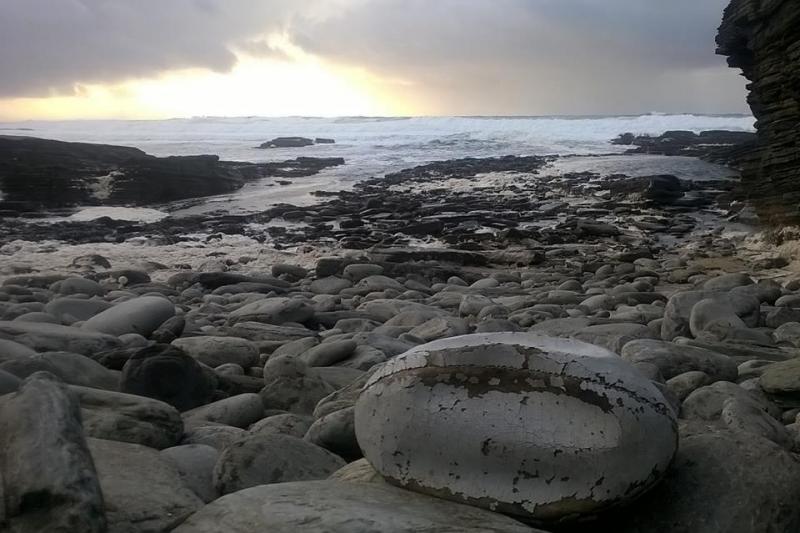 One of the beaches that Martin Gray regularly searches. (Courtesy Martin Gray)
One of the beaches that Martin Gray regularly searches. (Courtesy Martin Gray)
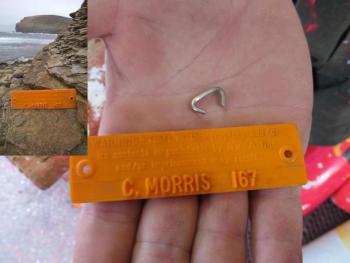 One of Corey Morris’ trap tags discovered on Billiacru Beach SW of the Orkney Islands in Scotland (inset) and another tag with a hog ring in Corey’s hand. (Photo by Kay Stephens and Martin Gray)
One of Corey Morris’ trap tags discovered on Billiacru Beach SW of the Orkney Islands in Scotland (inset) and another tag with a hog ring in Corey’s hand. (Photo by Kay Stephens and Martin Gray)
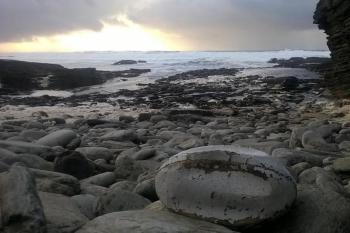 One of the beaches that Martin Gray regularly searches. (Courtesy Martin Gray)
One of the beaches that Martin Gray regularly searches. (Courtesy Martin Gray)
TENANTS HARBOR—When Scotland beachcomber Martin Gray went walking along one of his favorite beaches, Billiacru last week, about two miles from Stromness, the little fishing port where he grew up, he spied an orange plastic tag with the name C. Morris and the number #167 on it. An avid beachcomber since he was a teenager, he knew immediately what it was.
“We find lobstering gear from all along the eastern seaboard of North America, from Labrador to Rhode Island,” he said. “Maine gear is probably the largest single cohort (followed by Newfoundland/Labrador and Massachusetts) and includes escape vents, trap tags, TopMe tags, buoys, Plante sticks and pot heads.”
The little piece of plastic, was in fact, a dislodged trap tag owned by Corey Morris, 35, a lobsterman from Tenants Harbor. It had traveled roughly 3,000 miles through the Gulf Stream/North Atlantic Drift that spins gear out across the Atlantic to Europe.
Excited to locate the owner of his find, Gray posted a photo of the tag on his Facebook page Orkney Beachcombing.
“In many ways, Facebook is an almighty pain in the backside full of bland truisms, peoples’ dinners and soppy kittens,” Gray said. “But, for finding connections, it is unsurpassed. I posted a photo on my Facebook page of a Massachusetts float found here yesterday. I had the owners name in seven minutes. I find that absolutely staggering!”
As for Morris, he was just working in his garage, repainting all of his buoys and getting his gear readied for the season when his Facebook notifications went crazy. Maine followers of Gray’s Facebook page notified Morris that Gray wanted to get in touch with him so he did.
What makes this find special is that this tag “C. Morris #167” was also his grandfather’s initials and original license number. Charles "Charlie" Morris was the 167th person in the state of Maine to be issued a lobster license. The year before Charlie passed away, he transferred his license number to his then-six-year-old grandson, Corey. If he hadn't done that, the license would have been considered a lost or retired license.
”I was already in an outboard with my dad at that age,” said Morris. “I couldn't even haul the trap then I was so little. I can remember going home in the evenings and hauling 10 traps with my dad. He's now held his lobster license for 29 years. Current regulations don't allow lobster fishermen to transfer tags to family members any more, so #167 will retire with Morris. "If I wanted to give my daughter mine, I couldn't,” he explained. “She'd have to go into the lottery and get a five or six digit number."
"I noticed in Martin's picture that the holes of the tag are intact, so it didn't look like the hog ring ripped off," said Morris. He declined to say how it could have come off but every lobsterman who has had his gear molested, and tags ripped out to keep the trap (which runs around $100 per trap) knows it's a distinct possibility that the tag was deliberately cut out and discarded into the ocean.
Things have really changed since his grandfather’s day, he said. "Everything was built from scratch, wooden round traps, knit heads. They were happy to catch a crate a day and today, we have to catch several hundred pounds a day just to earn our living, but you know the money was different back in those days too.”
Gray has seen more trash float in on his beaches from the U.S. than he cares to, but when it comes to fishing gear, that’s different.
“The finds from Maine fishermen are special because I know that what reaches us from there isn't really litter,” he said. “Almost all of it was lost against the wishes of the fisherman, with very little casually thrown away. The escape vents float free but that is a conservation measure to render lost ghost pots nonlethal to marine life. A brilliant plan! We have nothing like it here. There's no such thing as ‘good litter,’ but escape vents come very close! I make clear distinctions between plastic in the sea that has been willfully dumped, lost by neglect or mismanagement and lost by accident. Maine pot gear is almost all lost by accident.”
Gray has been working the last five years to display the best of his beach finds into finds over the last few years into a museum.
“Finding Corey’s tag has been the highlight of my beachcombing winter,” Gray said. “It has a very special tale behind it and I can see it being a star exhibit one day.”
Related story: Maine’s treasures (and trash) wash up on Ireland’s shores
Event Date
Address
United States

